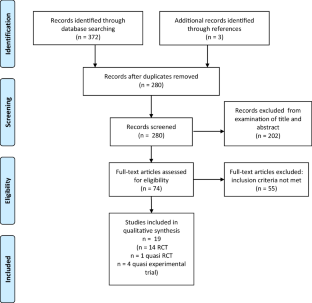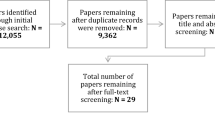Abstract
Aim
Extended reality (XR) provides technologies that can create engaging and interactive learning resources easily updatable in line with the learning needs. This systematic review aimed to investigate the academic performance (AP), level satisfaction (LS), and acceptability (Ac) of XRs in university education students of medicine and health sciences.
Method
The Preferred Reporting Items for Systematic Reviews statement was applied.
Results
Nineteen experimental studies were included, which examined AP, 15 LS and 4 AC. No study was found that applies the Metaverse, 15 considered virtual reality (VR), 3 Augmented Reality (AR), 1 Mixed Reality (MR). Ten studies showed a statistically significant increase in AP in students who adopted XRs compared to traditional teaching methodologies. Six 5 studies showed a significant increase in LS after VR use. Two studies reported a high percentage of significant acceptability of XR use.
Conclusion
The review provides that Metaverse results still need to be implemented; VR was a valid tool to support the improvement of AP and LS of students; VR turns out to be more widespread than other XRs. There are several discrepancies in the studies that confirm the need to promote the understanding of VR simulation’s effects on the acquisition of skills.

Similar content being viewed by others
Data availability
The data used to support the findings of this study are included within the article.
References
Aebersold M, Voepel-Lewis T, Cherara L et al (2018) Interactive anatomy-augmented virtual simulation training. Clin Simul Nurs 15:34–41. https://doi.org/10.1016/j.ecns.2017.09.008
Alawadhi M, Alhumaid K, Almarzooqi S et al (2022) Factors affecting medical students’ acceptance of the metaverse system in medical training in the United Arab Emirates. South Eastern European J Public Health 19
Almarzouqi A, Aburayya A, Salloum SA (2022) Prediction of user’s intention to use metaverse system in medical education: a hybrid SEM-ML learning approach. IEEE Access 10:43421–43434
Altman DG (1996) Better reporting of randomised controlled trials: the consort statement. BMJ 313:570–571
Asad MM, Naz A, Churi P, Tahanzadeh MM (2021) Virtual reality as pedagogical tool to enhance experiential learning: a systematic literature review. Educ Res Int 2021. https://doi.org/10.1155/2021/7061623
Bandura A (1977) Social learning theory. Prentice Hall, Englewood Cliffs
Behmadi S, Asadi F, Okhovati M, Sarabi RE (2022) Virtual reality-based medical education versus lecture-based method in teaching start triage lessons in emergency medical students: virtual reality in medical education. J Adv Med Educ Prof 10:48–53. https://doi.org/10.30476/jamp.2021.89269.1370
Beulens AJW, Hashish YAF, Brinkman WM et al (2021) Training novice robot surgeons: proctoring provides same results as simulator-generated guidance. J Robot Surg 15:397–428. https://doi.org/10.1007/s11701-020-01118-y
Billinghurst M, Clark A, Lee G (2014) A survey of augmented reality. Found Trends Human-Comput Interact 8:73–272. https://doi.org/10.1561/1100000049
Bimber O, Raskar R (2005) A brief introduction to augmented reality. In: Spatial augmented reality. A K Peters/CRC Press
Birrenbach T, Zbinden J, Papagiannakis G et al (2021) Effectiveness and utility of virtual reality simulation as an educational tool for safe performance of COVID-19 diagnostics: prospective, randomized pilot trial. JMIR Serious Games 9:https://doi.org/10.2196/29586
Bordage G (2009) Conceptual frameworks to illuminate and magnify. Med Educ 43:312–319. https://doi.org/10.1111/j.1365-2923.2009.03295.x
Bridge P, Gunn T, Kastanis L et al (2014) The development and evaluation of a medical imaging training immersive environment. J Med Rad Sci 61:159–165. https://doi.org/10.1002/jmrs.60
Chang C-Y, Sung H-Y, Guo J-L et al (2022) Effects of spherical video-based virtual reality on nursing students’ learning performance in childbirth education training. Interact Learn Environ 30:400–416. https://doi.org/10.1080/10494820.2019.1661854
Chang S-C, Tung F-C (2007) An empirical investigation of students’ behavioural intentions to use the online learning course websites. Br J Educ Technol 0:070625111823003-??? https://doi.org/10.1111/j.1467-8535.2007.00742.x
Chao Y-P, Kang C-J, Chuang H-H et al (n.d.) Comparison of the effect of 360 degrees versus two-dimensional virtual reality video on history taking and physical examination skills learning among undergraduate medical students: a randomized controlled trial. Virtual Reality. https://doi.org/10.1007/s10055-022-00664-0
Chen F-Q, Leng Y-F, Ge J-F et al (2020) Effectiveness of virtual reality in nursing education: meta-analysis. J Med Internet Res 22:e18290. https://doi.org/10.2196/18290
Copson B, Wijewickrema S, Sorace L et al (2021) Development of a virtual reality clinically oriented temporal bone anatomy module with randomised control study of three-dimensional display technology. BMJ Simul Technol Enhanced Learn 7:352–359. https://doi.org/10.1136/bmjstel-2020-000592
Dhar E, Bah AN, Chicchi Giglioli IA et al (2023) A scoping review and a taxonomy to assess the impact of mobile apps on cancer care management. Cancers (basel) 15:1775. https://doi.org/10.3390/cancers15061775
Ekstrand C, Jamal A, Nguyen R et al (2018) Immersive and interactive virtual reality to improve learning and retention of neuroanatomy in medical students: a randomized controlled study. CMAJ Open 6:E103–E109. https://doi.org/10.9778/cmajo.20170110
Engum S, Jeffries P, Fisher L (2003) Intravenous catheter training system: computer-based education versus traditional learning methods. Am J Surg 186:67–74. https://doi.org/10.1016/S0002-9610(03)00109-0
Falah J, Khan S, Alfalah T et al (2014) Virtual reality medical training system for anatomy education. 2014 Science and Information Conference. IEEE, London, pp 752–758
Gnanasegaram JJ, Leung R, Beyea JA (2020) Evaluating the effectiveness of learning ear anatomy using holographic models. J Otolaryngol-Head Neck Surg 49. https://doi.org/10.1186/s40463-020-00458-x
Gray M, Downer T, Hartz D et al (2022) The impact of three-dimensional visualisation on midwifery student learning, compared with traditional education for teaching the third stage of labour: a pilot randomised controlled trial. Nurse Educ today 108. https://doi.org/10.1016/j.nedt.2021.105184
Halpern SM, Joanne H Douglas (2005) Appendix: jadad scale for reporting randomized controlled trials. In: Evidence-based obstetric anesthesia. John Wiley & Sons, Ltd, pp 237–238
Han SG, Kim YD, Kong TY, Cho J (2021) Virtual reality-based neurological examination teaching tool(VRNET) versus standardized patient in teaching neurological examinations for the medical students: a randomized, single-blind study. BMC Med Educ 21. https://doi.org/10.1186/s12909-021-02920-4
Jadad AR, Moore RA, Carroll D et al (1996) Assessing the quality of reports of randomized clinical trials: is blinding necessary? Control Clin Trials 17:1–12. https://doi.org/10.1016/0197-2456(95)00134-4
Jallad ST, Isik B (2022) The effectiveness of virtual reality simulation as learning strategy in the acquisition of medical skills in nursing education: a systematic review. Ir J Med Sci 191:1407–1426. https://doi.org/10.1007/s11845-021-02695-z
Kim H-Y, Kim E-Y (2023) Effects of medical education program using virtual reality: a systematic review and meta-analysis. Int J Environ Res Public Health 20:3895. https://doi.org/10.3390/ijerph20053895
Kucuk S, Kapakin S, Goktas Y (2016) Learning anatomy via mobile augmented reality: effects on achievement and cognitive load. Anat Sci Educ 9:411–421. https://doi.org/10.1002/ase.1603
Lebdai S, Mauget M, Cousseau P et al (2021) Improving academic performance in medical students using immersive virtual patient simulation: a randomized controlled trial. J Surg Educ 78:478–484. https://doi.org/10.1016/j.jsurg.2020.08.031
Liberati A, Altman DG, Tetzlaff J et al (2009) The PRISMA statement for reporting systematic reviews and meta-analyses of studies that evaluate health care interventions: explanation and elaboration. PLoS Med 6:e1000100. https://doi.org/10.1371/journal.pmed.1000100
Lorenzo-Alvarez R, Rudolphi-Solero T, Ruiz-Gomez MJ, Sendra-Portero F (2019) Medical student education for abdominal radiographs in a 3D virtual classroom versus traditional classroom: a randomized controlled trial. Am J Roentgenol 213:644–650. https://doi.org/10.2214/AJR.19.21131
Losco CD, Grant WD, Armson A et al (2017) Effective methods of teaching and learning in anatomy as a basic science: A BEME systematic review: BEME guide no. 44. Med Teach 39:234–243. https://doi.org/10.1080/0142159X.2016.1271944
Mahtab EAF, Egorova AD (2022) Current and future applications of virtual reality technology for cardiac interventions. Nat Rev Cardiol 19:779–780. https://doi.org/10.1038/s41569-022-00789-4
Maresky HS, Oikonomou A, Ali I et al (2019) Virtual reality and cardiac anatomy: exploring immersive three-dimensional cardiac imaging, a pilot study in undergraduate medical anatomy education. Clin Anat 32:238–243. https://doi.org/10.1002/ca.23292
Mystakidis S (2022) Metaverse Encyclop 2:486–497
Park BJ, Hunt SJ, Martin C et al (2020) Augmented and mixed reality: technologies for enhancing the future of IR. J Vasc Interv Radiol 31:1074–1082. https://doi.org/10.1016/j.jvir.2019.09.020
Pickering JD, Panagiotis A, Ntakakis G et al (2022) Assessing the difference in learning gain between a mixed reality application and drawing screencasts in neuroanatomy. Anat Sci Educ 15:628–635. https://doi.org/10.1002/ase.2113
Ryan GV, Callaghan S, Rafferty A et al (2022) Learning outcomes of immersive technologies in health care student education: systematic review of the literature. J Med Internet Res 24:e30082. https://doi.org/10.2196/30082
Smith HP (2021) The role of virtual reality in criminal justice pedagogy: an examination of mental illness occurring in corrections. J Crim Justice Educ 32:252–271. https://doi.org/10.1080/10511253.2021.1901948
Smith S, Farra SL, Hodgson E (2021) Evaluation of two simulation methods for teaching a disaster skill. BMJ Simul Technol Enhanced Learn 7:92–96. https://doi.org/10.1136/bmjstel-2019-000572
Tudor Car L, Soong A, Kyaw BM et al (2019) Health professions digital education on clinical practice guidelines: a systematic review by digital health education collaboration. BMC Med 17:139. https://doi.org/10.1186/s12916-019-1370-1
Ulrich F, Helms NH, Frandsen UP, Rafn AV (2021) Learning effectiveness of 360 degrees video: experiences from a controlled experiment in healthcare education. Interact Learn Environ 29:98–111. https://doi.org/10.1080/10494820.2019.1579234
Wang Y, Su Z, Zhang N et al (2022) A survey on metaverse: fundamentals, security, and privacy. IEEE Communications Surveys & Tutorials
Wu M-L, Chao L-F, Xiao X (2022) A pediatric seizure management virtual reality simulator for nursing students: a quasi-experimental design. Nurse Educ Today 119:https://doi.org/10.1016/j.nedt.2022.105550
Wu T-C, Ho C-TB (2022) A scoping review of metaverse in emergency medicine. Australasian Emerg Care. https://doi.org/10.1016/j.auec.2022.08.002
Yu Z, Xu W (2022) A meta-analysis and systematic review of the effect of virtual reality technology on users’ learning outcomes. Comput Appl Eng Educ 30:1470–1484. https://doi.org/10.1002/cae.22532
Funding
None.
Author information
Authors and Affiliations
Contributions
Shima Gholamalishahi: performed literature search, article selection, analysis, and manuscript editing;Vanessa India Barletta: performed literature search, article selection, analysis; Maria Vittoria Manai: performed literature search, article selection, analysis; Federica Battisti: provided data clarifications and revision; Laura Centonze: article selection, construct of the themes, manuscript review;Giuseppe La Torre: concepts, design, the definition of intellectual content and revised the manuscript; Alice Mannocci: conceived of the study, supervised the project, assisted with analysis, manuscript writing and revised the manuscript. All authors discussed the results and contributed to the final manuscript.
Corresponding author
Ethics declarations
Ethics approval
This work is a systematic review and thus no ethical approval is required.
Competing interests
The authors have no financial or non-financial interests to disclose.
Additional information
Publisher's Note
Springer Nature remains neutral with regard to jurisdictional claims in published maps and institutional affiliations.
Supplementary Information
Below is the link to the electronic supplementary material.
Rights and permissions
Springer Nature or its licensor (e.g. a society or other partner) holds exclusive rights to this article under a publishing agreement with the author(s) or other rightsholder(s); author self-archiving of the accepted manuscript version of this article is solely governed by the terms of such publishing agreement and applicable law.
About this article
Cite this article
Gholamalishahi, S., Barletta, V.I., Manai, M.V. et al. Impact of immersive realities and metaverse in the university training for health professions and medicine: a systematic review of preliminary evidence. J Public Health (Berl.) (2024). https://doi.org/10.1007/s10389-024-02268-1
Received:
Accepted:
Published:
DOI: https://doi.org/10.1007/s10389-024-02268-1




